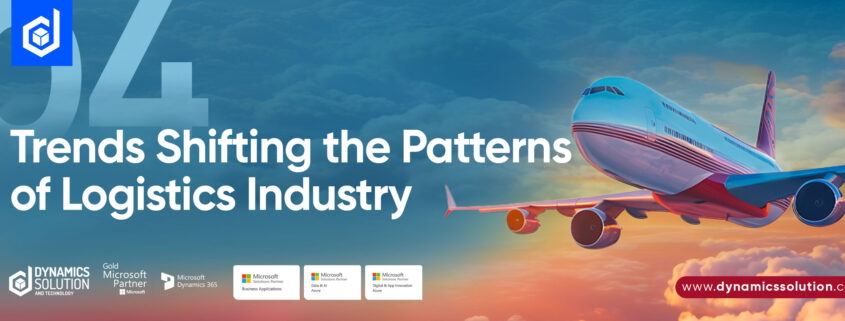In the fast-paced world of logistics, the only constant is change. With the rise of technology, evolving consumer expectations, and global challenges, the logistics industry is undergoing a significant transformation. Global digital transformation spending in the logistics industry, which was about $3 billion in the year 2020, is projected to reach $84.6 billion by 2027.
With the use of high-tech solutions logistics professionals have solved major issues but with the changing customer expectations the logistics & transportation industry needs to revamp its business model.
Let’s delve into four key trends that are reshaping the patterns of the logistics landscape.
Digital Transformation and Technology Integration
The heartbeat of the modern logistics industry is its embrace of digital transformation and the seamless integration of cutting-edge technologies. Digital transformation plays a crucial role in the logistics industry, bringing about significant improvements in efficiency, visibility, and overall operational performance.
- Robotic Process Automation (RPA) and autonomous vehicles streamline routine tasks, reducing manual errors and increasing efficiency.
- Leveraging data analytics helps in optimizing routes, inventory management, and overall supply chain performance.
- Technologies like GPS, RFID, and IoT sensors enable real-time tracking of shipments, providing better visibility into the entire supply chain.
- Using blockchain for logistics can enhance transparency, traceability, and security in the supply chain.
- IoT and RFID technologies help in real-time tracking of inventory levels, reducing the chances of stockouts or overstock situations.
- E-commerce platforms, mobile apps, and online portals enhance the customer experience by providing real-time tracking, delivery notifications, and easy communication.
- Automation and optimization lead to cost savings by reducing labor costs, fuel consumption, and operational inefficiencies.
Embracing these technological advancements is essential for staying competitive in the rapidly evolving logistics landscape.
Data Analytics and Predictive Analytics
In the digital era, data is king. Logistics companies are harnessing the power of big data analytics to gain valuable insights into supply chain patterns. By analyzing vast amounts of data, these companies can optimize routes, predict demand fluctuations, and enhance overall operational efficiency.
- Gain better visibility into their supply chain, allowing for quicker response to issues and better decision-making.
- Identifying cost-saving opportunities, optimizing routes, and minimizing unnecessary expenses, leading to overall cost reduction.
- Monitoring and managing inventory levels effectively, reducing the risk of stockouts or overstock situations.
- Anticipate customer needs, optimize inventory levels, and plan resources more effectively.
- Predictive analytics can be applied to supplier relationships, helping logistics companies anticipate potential issues, manage risks, and optimize supplier networks.
Data and Predictive analytics play a pivotal role in anticipating challenges before they arise. This proactive approach allows logistics providers to identify potential disruptions and take corrective measures, minimizing the impact on the supply chain.
Sustainability and Green Logistics
The global call for sustainability is resonating within the logistics industry. As environmental concerns take center stage, logistics companies are reevaluating their practices to align with green initiatives. This involves optimizing transportation routes to reduce carbon emissions, adopting energy-efficient technologies, and exploring alternative fuels for vehicles.
- Sustainable practices often involve optimizing routes, reducing excess packaging, and improving overall efficiency, leading to cost savings.
- Adhering to sustainability practices helps logistics companies comply with increasingly stringent environmental regulations related to emissions and environmental impact.
- Environmentally conscious consumers are more likely to choose companies that prioritize sustainability, leading to increased customer loyalty.
- Embracing sustainability encourages innovation, leading to the development and adoption of new technologies and practices that benefit the environment and improve logistics operations.
- Some markets and customers prefer or mandate sustainable practices. Adhering to green logistics standards enhances access to such markets and improves competitiveness on a global scale.
Customers and stakeholders are placing increasing importance on environmentally responsible supply chain practices. Logistics companies are responding by incorporating sustainable solutions into their operations. The journey towards green logistics is not just a trend; it’s a fundamental shift towards a more responsible and future-ready industry.
E-Commerce and Last-Mile Delivery Optimization
The e-commerce boom has unleashed a wave of changes in logistics strategies. As consumers increasingly expect faster and more reliable deliveries, logistics companies must optimize their last-mile delivery services. The industry is witnessing a surge in innovative solutions, from autonomous vehicles to drones, aimed at streamlining the final leg of the delivery journey.
- E-commerce integration with logistics systems enables real-time tracking of inventory levels to help prevent stockouts and reduce overstock situations.
- Advanced route optimization algorithms and GPS technologies help in planning the most efficient delivery routes.
- Last-mile delivery often constitutes a significant portion of overall logistics costs. Optimization strategies focus on reducing fuel consumption, minimizing vehicle idle time, and improving delivery density.
- Last-mile optimization strategies need to be adaptable to changing demand patterns and scalable to handle fluctuations in delivery volumes.
- Collaboration with local partners, such as third-party delivery services or crowdsourced delivery models, can enhance last-mile efficiency.
- Strategies for last-mile optimization also consider environmentally friendly practices, such as electric vehicles and sustainable delivery practices, to reduce the ecological impact.
Same-day and next-day delivery services have become the new norm, and logistics providers are investing heavily in technology to meet these demands. The challenge lies not only in speed but also in maintaining cost-effectiveness and environmental sustainability. Balancing these factors requires a strategic approach and continual innovation, like the one crafted by the modules in Microsoft Dynamics 365 Supply Chain Management, helping the logistics industry seamlessly flow through the value stream.
Embracing Change for a Resilient Future
Adaptability becomes a key asset as the logistics industry navigates these transformative trends. The companies that thrive will be those that embrace digital transformation, innovate in response to e-commerce demands, leverage the power of data, and prioritize sustainability. The future of logistics is dynamic, and staying ahead means not just keeping pace with change but leading the way towards a more efficient, connected, and sustainable supply chain.
Dynamics 365 supply chain management is a comprehensive business process management solution that can help organizations optimize their inventory to deliver processes. The platform provides end-to-end visibility into the entire supply chain, from procurement and inventory management to order fulfillment and delivery, thereby benefiting all of the stakeholders in the value chain.
Dynamics Solution and Technology helps businesses seamlessly attune their industrial business landscape with Microsoft Dynamics 365 Supply Chain Management. Being a Microsoft Gold Partner, we have a global footprint for numerous satisfactory clients across the globe, especially in the Gulf and Mena regions.
A testimony to win business excellence, our experts ensure a seamless deployment process, allowing you to witness significant technological breakthroughs and tread the path to success.
If you are looking for ways to deploy Microsoft Dynamics 365 Supply Chain Management into your business, then look no further and contact us today.
Your supply chain transformation begins today!







